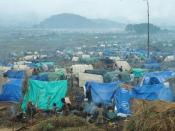Genocide - The deliberate and systematic extermination of a national, racial, political, or cultural group. (The Merriam Webster Dictionary) ". . . Acts of genocide may have been committed. . ." (United Nations Conference on May 7, 1994) On April 6, 1994 the lives of almost one million people, many of Tutsi origin, in Rwanda took a turn for the worst. On April 6, 1994 in the town of Gisenyi the order to "cut the trees down" was broadcasted over the RTLM Hutu extremist radio station. On April 6, the first acts of the genocide took place and didn't stop until exactly one hundred days later on July 14, 1994. The Hutu resentment of the Tutsi resulted in the deaths of almost one million Tutsis and moderate Hutus. What was going on in Rwanda went unnoticed to the World for 42 days and the only people who knew were the United Nations and the citizens of Rwanda.
Who deserves more of the blame: the Hutus for committing the genocide or the people withholding help to the innocent victims because they are worth nothing of intrinsic value?
Rwanda's problems started way before the one hundred days of slaughtering. The countries problems started around the year 1918 when the previous colonizers the Germans were defeated in World War I. The United Nations granted Rwanda to the Belgians as a trust territory. In Rwanda there are two distinct racial ethnicities that dominate the country the Tutsi and the Hutu. The majority is the Hutu who are from what is now present day Chad during the 11th century. They believe that they arrived before the Tutsi and should be the dominate race since they have had small kingdoms for centuries. The minority is the Tutsi who migrated from present day Ethiopia. The...


